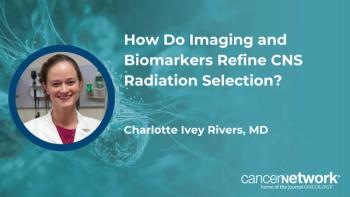
Oncology NEWS International
- Oncology NEWS International Vol 10 No 4
- Volume 10
- Issue 4
New HIV Guidelines Lower the Count for Starting Therapy Antiretroviral Therapy
BETHESDA, Md-Revised guidelines for treating HIV-infected adults provide new recommendations for when physicians should initiate anti-HIV therapy. "The new treatment guidelines provide patients and their doctors with evidence-based recommendations for initiating antiretroviral therapy that take into account both the benefits and potential risks of currently available treatment regimens," said Anthony S. Fauci, MD, director of the National Institute of Allergy and Infectious Diseases (NIAID).
BETHESDA, MdRevised guidelines for treating HIV-infected adults provide new recommendations for when physicians should initiate anti-HIV therapy. "The new treatment guidelines provide patients and their doctors with evidence-based recommendations for initiating antiretroviral therapy that take into account both the benefits and potential risks of currently available treatment regimens," said Anthony S. Fauci, MD, director of the National Institute of Allergy and Infectious Diseases (NIAID).
The Guidelines for the Use of Anti-retroviral Agents in HIV-Infected Adults and Adolescents were first published in 1998 by the Panel on Clinical Practices for the Treatment of HIV Infection. The panel, a joint effort of the Department of Health and Human Services and the Henry J. Kaiser Family Foundation, designed the guidelines as an Internet-based "living document" that would be updated as significant new data emerged.
The new guidelines recommend that physicians initiate antiretroviral therapy when an asymptomatic patient’s CD4+ T-cell count drops below 350 cells/mm3.
Previously, the guidelines advised starting HIV treatment of asymptomatic patients when CD4+ T-cell counts fell below a level of 500/mm3.
The new recommendations also suggest that treatment in asymptomatic HIV patients with CD4+ counts higher than 350 cells/mm3 should be considered when the virus level in plasma reaches more than 30,000 copies/mL, as measured by the branched DNA test, or 55,000 copies/mL using the RT-PCR test.
Previously, the recommendations advised treating such patients when their HIV plasma levels reached 10,000 and 20,000 copies/mL, respectively.
The guidelines continue previous recommendations that all individuals with acute HIV syndrome, those within 6 months of HIV seroconversion, and those with symptoms ascribed to HIV-related infections receive antiretroviral therapy.
Patient Compliance
The panel emphasized the importance of patient compliance with therapy. "Extraordinarily high rates of adherence to an antiviral drug regimen are necessary to maintain control over HIV replications," said co-chair John G. Bartlett, MD, chief of infectious diseases, Johns Hopkins University Medical Center. "HIV is very unforgiving in this regard."
The new guidelines include some new drug-specific recommendations for treatment. Two combinations were "strongly recommended"Kaletra, a co-formulation of the protease inhibitors ritonavir and lopinavir (Norvir), and a combination of ritonavir and indinavir (Crixivan).
"These treatment options take advantage of the ability of ritonavir to boost the levels of other protease inhibitors, creating a potent anti-HIV combination," the NIAID said.
The updated guidelines also contain a revised section on the expanding scope of toxicities associated with antiretroviral drug therapy. Dr. Fauci cited specifically the "alarming" changes in fat metabolismin particular, dangerously high levels of cholesterol and triglyceridesassociated with therapy.
The panel noted that the new recommendations are only intended to help patients and their physicians make treatment decisions and should not be regarded as medical gospel. "The updated guidelines recognize that we do not yet have the data we need to make definitive recommendations about the optimal time to start treatment," Dr. Bartlett said.
The updated HIV-treatment guidelines are available on the Internet at
Articles in this issue
almost 25 years ago
IOM Urges Action to Fix ‘Broken’ US Health Care Systemalmost 25 years ago
Thompson Pledges Fundamental HCFA Reformalmost 25 years ago
NCCN Updates Its Practice Guideline for Breast Canceralmost 25 years ago
Smoking Prevalence, Mortality Ranges Widely From State to Statealmost 25 years ago
NCI Debuts New Program for Cancer Advocatesalmost 25 years ago
Fiberoptic Ductoscopy for Nipple Discharge DisWomen With Nipple Dischargealmost 25 years ago
Augmerosen, Antisense Drug, in Phase III Testing in Melanomaalmost 25 years ago
Automated System Improves Accuracy of HER-2 Scoringalmost 25 years ago
Small Advantage for Adjuvant Paclitaxel in Early Breast Canceralmost 25 years ago
Prostate Cancer Research at UCSF Focuses on Dendritic CellsNewsletter
Stay up to date on recent advances in the multidisciplinary approach to cancer.












































